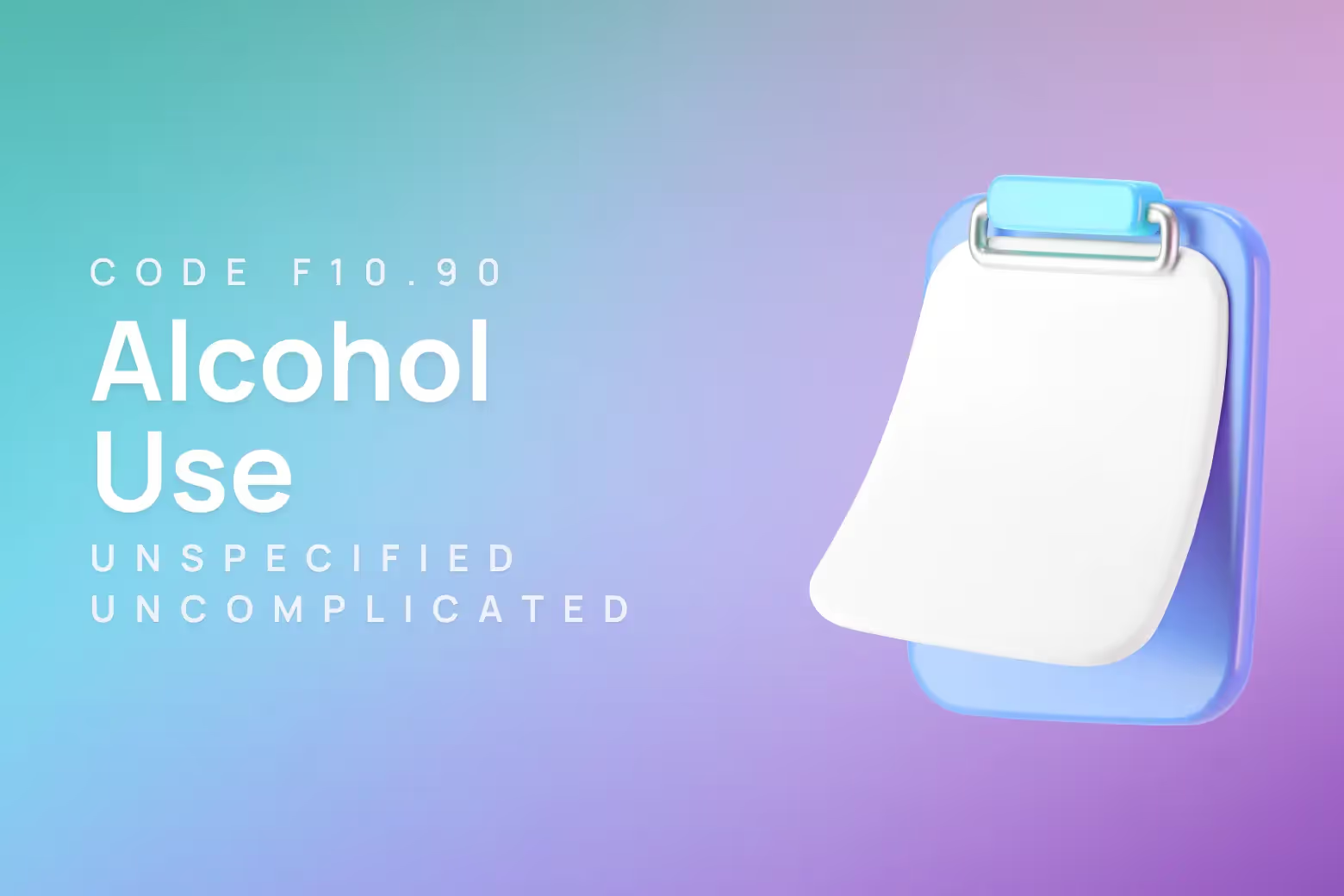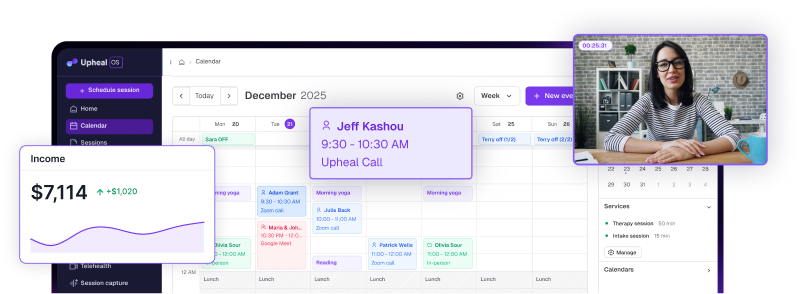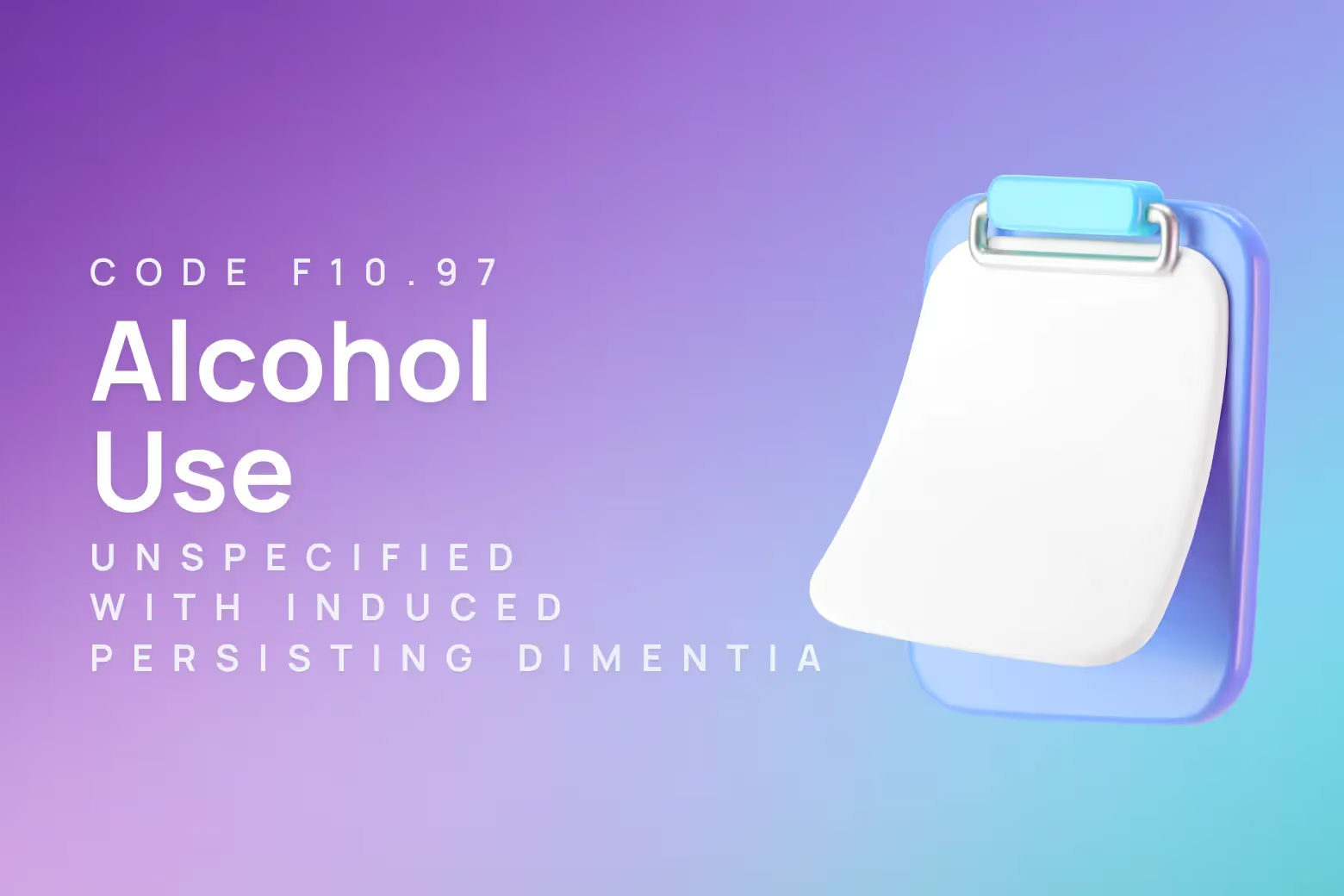ICD-10 code for alcohol use, unspecified, uncomplicated

F10.90 is the ICD-10 code for alcohol use, unspecified, uncomplicated.
This code represents alcohol-related concerns that don't meet full criteria for alcohol use disorder or exhibit significant complications.
Accurate coding helps clinicians document clinical presentations while supporting appropriate billing and treatment planning.
Key features:
-
- Captures alcohol-related concerns without meeting full AUD diagnostic thresholds
- Excludes complicated presentations involving withdrawal, intoxication, or other alcohol-induced conditions
- Serves as a bridge diagnosis when insufficient information exists to specify severity or remission status
- Commonly used during initial assessments before gathering complete clinical history

Diagnostic criteria for alcohol use, unspecified, uncomplicated (F10.90)
Clinicians assign F10.90 when a client's alcohol consumption raises clinical concern but doesn't clearly meet the threshold for mild, moderate, or severe alcohol use disorder.
This code addresses situations where alcohol plays a role in the clinical picture without exhibiting the full symptom constellation required for more specific diagnoses.
The "unspecified" component indicates insufficient information to determine whether criteria for alcohol use disorder are met or to establish severity level.
Perhaps the client hasn't disclosed complete drinking patterns yet. Maybe collateral information remains unavailable. The clinical picture might be emerging during early sessions.
The "uncomplicated" qualifier distinguishes this presentation from situations involving withdrawal symptoms, intoxication episodes, or alcohol-induced mental disorders.
Clients coded F10.90 don't show signs of physiological dependence requiring medical management. They're not experiencing delirium, psychosis, or other conditions directly caused by alcohol's effects on the brain.
Common scenarios warranting F10.90 include:
- Initial screening reveals concerning alcohol consumption patterns requiring further assessment
- Client acknowledges drinking but provides limited details about frequency, quantity, or consequences
- Collateral sources mention alcohol involvement without confirming diagnostic criteria
- Clinical judgment suggests alcohol contributes to presenting problems without meeting full disorder criteria
- Documentation requirements necessitate an alcohol-related code before comprehensive evaluation completes
When to use F10.90 diagnosis code
Differential diagnosis becomes crucial when distinguishing F10.90 from related alcohol-use codes. Each code captures specific clinical presentations that guide treatment planning and documentation.
F10.90 vs F10.9 (Alcohol use, unspecified)
F10.9 functions as an even broader category than F10.90, lacking the "uncomplicated" specification. Use F10.9 when alcohol involvement appears clinically relevant but you haven't determined whether complications exist. This might occur during brief emergency encounters or crisis situations where comprehensive assessment isn't feasible.
F10.90 adds the "uncomplicated" qualifier, indicating you've ruled out withdrawal, intoxication, and alcohol-induced conditions. Choose F10.90 when you've gathered enough information to confirm no complications are present but still lack details to specify use disorder criteria or severity.
F10.90 vs F10.10 (Alcohol abuse, uncomplicated)
While F10.10 existed in earlier ICD-10 versions, DSM-5 eliminated the abuse/dependence distinction. Current practice combines these categories into alcohol use disorder with severity specifiers. If using F10.10, you're documenting a pattern meeting abuse criteria—recurrent problems causing significant impairment without dependence features.
F10.90 applies when the clinical picture doesn't clearly meet even abuse-level criteria. Perhaps problems exist but don't demonstrate the recurrent, maladaptive pattern required for abuse diagnosis. The client might be in early stages of problematic use or experiencing subclinical concerns warranting monitoring.
F10.90 vs F10.20 (Alcohol dependence, uncomplicated)
F10.20 indicates physiological or psychological dependence features like tolerance, withdrawal symptoms, or compulsive use patterns. This represents more severe alcohol involvement requiring structured intervention.
F10.90 excludes dependence features entirely. Clients don't demonstrate tolerance requiring increased amounts to achieve desired effects. They're not experiencing withdrawal when reducing consumption. Drinking hasn't become compulsive or taken precedence over other life activities. Use F10.90 when concerns exist but dependence indicators are absent.
Related ICD-10 codes
Understanding related codes helps clinicians navigate the full spectrum of alcohol-related diagnoses:
- F10.9 - Alcohol use, unspecified (broader category without complication status)
- F10.91 - Alcohol use, unspecified, in remission (documents recovery progress)
- F10.10 - Alcohol abuse, uncomplicated (recurrent problematic use without dependence)
- F10.20 - Alcohol dependence, uncomplicated (physiological or psychological dependence present)
- F10.120 - Alcohol use disorder, mild (meets 2-3 DSM-5 criteria)
- F10.220 - Alcohol use disorder, moderate (meets 4-5 DSM-5 criteria)
- F10.230 - Alcohol use disorder, moderate, in early remission
- F10.920 - Alcohol use, unspecified, with intoxication, uncomplicated
Interventions and CPT codes for alcohol use concerns
Effective treatment for clients coded F10.90 emphasizes screening, brief intervention, and monitoring while building therapeutic alliance. These approaches help clarify the clinical picture while addressing emerging concerns.
Screening and assessment (90791, 99408, 99409, G0396, G0397)
Comprehensive psychiatric evaluation using 90791 establishes baseline functioning and gathers detailed alcohol-use history. This initial assessment explores drinking patterns, consequences, family history, and readiness for change. The evaluation creates foundation for treatment planning while clarifying whether criteria for more specific diagnoses emerge.
Structured screening with brief intervention uses 99408 (15-30 minutes) or 99409 (over 30 minutes) for commercial payers. These codes document standardized screening tools like the AUDIT or AUDIT-C alongside focused counseling about risks and reduction strategies. Medicare programs may require G0396 or G0397 instead for similar screening and intervention services.
Document the specific screening instrument, raw score, risk level interpretation, and minutes spent providing feedback and brief counseling. Include motivational interviewing elements or FRAMES (Feedback, Responsibility, Advice, Menu of options, Empathy, Self-efficacy) components delivered during the session.
Individual psychotherapy (90832, 90834, 90837)
Ongoing individual therapy sessions use time-based coding: 90832 for 16-37 minutes, 90834 for 38-52 minutes, or 90837 for 53+ minutes. These sessions employ evidence-based approaches like motivational interviewing, cognitive-behavioral therapy adapted for substance concerns, or relapse prevention strategies.
Treatment focuses on exploring ambivalence about changing drinking patterns, identifying triggers and high-risk situations, developing coping strategies, and building motivation for behavior change. Sessions might address co-occurring anxiety or depression contributing to alcohol use while strengthening protective factors.
Clinical documentation should specify intervention techniques used, progress toward treatment goals, and any changes in alcohol consumption patterns observed between sessions. Note whether the client demonstrates increased readiness for change or whether additional assessment becomes necessary.
Family therapy (90846, 90847)
Family sessions without the patient (90846) or with the patient present (90847) address relationship dynamics affecting alcohol use. These sessions explore family communication patterns, codependency issues, and ways loved ones can support recovery efforts without enabling continued use.
Family therapy helps members understand how their responses might inadvertently maintain drinking behaviors. Sessions develop family-wide strategies for supporting change while establishing healthy boundaries. This approach proves particularly valuable when family history includes substance use patterns.
Group therapy (90853)
Group psychotherapy using 90853 provides peer support and skills development in a structured setting. Groups focused on substance use concerns offer normalization of struggles, shared problem-solving, and accountability between members.
Group interventions teach practical skills for managing cravings, refusing social pressure to drink, and navigating high-risk situations. Members learn from others' experiences while receiving feedback about their own patterns. This format efficiently delivers evidence-based content while building community connections.
Crisis intervention (90839, 90840)
When acute situations arise involving intoxication risk, dangerous decision-making, or imminent harm related to alcohol use, crisis psychotherapy becomes necessary. Code 90839 covers the first 60 minutes with 90840 as an add-on for each additional 30 minutes beyond the first hour.
Crisis sessions require immediate intervention to establish safety, assess risk level, coordinate with medical providers if withdrawal concerns exist, and develop short-term stabilization plans. Documentation must clearly indicate the crisis nature of the presentation and interventions provided to address immediate danger.
How Upheal improves F10.90 ICD-10 documentation
Clinical documentation platforms like Upheal help behavioral health clinicians maintain accurate records while reducing time spent on administrative tasks. These tools support quality care delivery by handling routine documentation requirements efficiently.
Suggesting appropriate ICD-10 codes based on session content
Upheal's AI analyzes session content and suggests relevant diagnostic codes matching the clinical presentation discussed. When a therapist explores a client's drinking patterns without identifying clear disorder criteria, the platform recognizes this presentation and recommends F10.90 as an appropriate code choice.
This assistance helps clinicians navigate the nuanced distinctions between alcohol-related codes. The platform considers factors like complication status, severity indicators, and remission criteria mentioned during sessions. Therapists maintain final decision-making authority while benefiting from intelligent suggestions based on documented clinical content.
Code recommendations appear alongside generated progress notes, allowing clinicians to verify accuracy against their clinical judgment. This workflow reduces time spent searching code databases while improving diagnostic accuracy through consistent application of coding guidelines.
Maintaining HIPAA-compliant records with proper diagnostic coding
Upheal ensures all clinical documentation meets regulatory requirements for security and privacy. The platform encrypts session recordings and notes while maintaining audit trails showing who accessed client information and when.
Diagnostic codes integrate seamlessly into compliant documentation workflows. Each code assignment connects to specific clinical evidence documented in session notes, creating clear rationale for diagnostic decisions. This linkage supports medical necessity determinations during insurance reviews while protecting client confidentiality.
The platform automatically generates documentation meeting payer requirements for the selected diagnostic code. When F10.90 is chosen, notes reflect the assessment findings supporting this diagnosis while excluding information about complications or severe symptoms that would warrant different codes.
Reducing administrative burden so you can focus on client care
Time spent on documentation directly reduces time available for client care or personal wellbeing. Upheal automates routine documentation tasks, allowing clinicians to complete thorough notes in minutes rather than hours.
The platform generates progress notes from session recordings, capturing key clinical content discussed during appointments. Therapists review and edit these AI-generated notes for accuracy rather than creating documentation from scratch. This approach maintains clinical oversight while eliminating repetitive typing.
Diagnostic code suggestions appear within the documentation workflow, eliminating separate searches through code databases. Clinicians quickly confirm appropriate codes and move forward with their day. The cumulative time savings across a full caseload creates meaningful improvements in work-life balance.
Supporting clients with alcohol-related concerns
Clients presenting with alcohol concerns captured by F10.90 often benefit from collaborative, non-judgmental exploration of their drinking patterns.
These individuals might not view themselves as having a "drinking problem," making therapeutic alliance and motivational approaches particularly important.
Assessment continues across multiple sessions as trust develops and clients feel safe disclosing more detailed information about their alcohol use.
Clinicians watch for emerging patterns suggesting more specific diagnoses while validating client experiences and building readiness for change.
This patient-centered approach respects autonomy while gently exploring discrepancies between stated goals and current behaviors.
Treatment planning emphasizes harm reduction and gradual behavior change rather than immediate abstinence demands.
Clients set their own goals while clinicians provide education about risks, monitor progress, and offer support. This flexible stance acknowledges that change occurs on a continuum, with even small reductions in risky drinking representing meaningful improvement.
Clinical documentation platforms like Upheal support this careful, ongoing assessment process by capturing session details that inform diagnostic clarity over time.
When documentation becomes easier to maintain, clinicians can focus their energy on the therapeutic relationship and clinical decision-making that truly matters.












